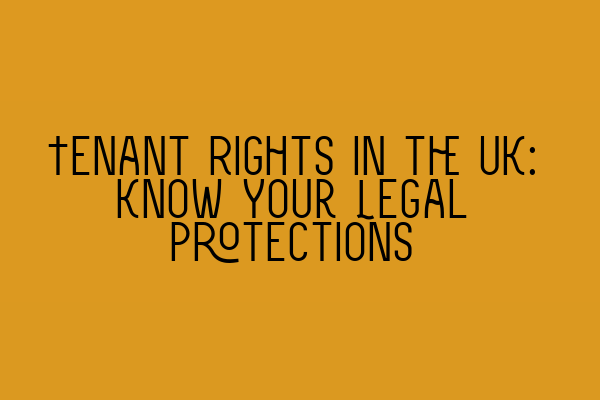Tenant Rights in the UK: Know Your Legal Protections
As a tenant in the UK, understanding your rights and legal protections is vital for a smooth and secure tenancy. Whether you’re renting a residential property or a commercial space, knowing your rights can help you avoid potential disputes and ensure that you’re treated fairly. In this article, we’ll guide you through the key tenant rights in the UK, empowering you with the knowledge you need to protect your interests.
Tenancy Agreements and Deposits
One of the first steps in securing a tenancy is signing a tenancy agreement. This legally binding document outlines the terms and conditions of your tenancy and should provide clarity on your rights and responsibilities as a tenant. It’s essential to carefully review the agreement before signing and seek legal advice if necessary.
Additionally, landlords are required to protect your tenancy deposit in a government-approved scheme within 30 days of receiving it. The deposit should be returned to you at the end of your tenancy, provided you meet the agreed-upon terms and conditions. If your landlord fails to protect your deposit or return it without a valid reason, you may be entitled to compensation.
For comprehensive guidance on tenancy agreements, deposit protection, and other related topics, visit our SQE 1 Practice Exam Questions article.
Rent and Rent Increases
As a tenant, you have the right to know how much rent you need to pay and when it’s due. Your landlord should provide you with a rent book or other written document that outlines this information. If you’re facing difficulties paying your rent, it’s crucial to communicate with your landlord as early as possible to explore potential solutions.
Regarding rent increases, your landlord cannot arbitrarily raise the rent during a fixed-term tenancy unless there’s a specific clause allowing for this in your tenancy agreement. After the fixed term ends, your landlord can increase the rent, but they must follow the legally required procedures and provide you with proper notice.
If you’d like to learn more about rent-related matters and how to handle rent increases, our SQE 1 Practice Mocks FLK1 FLK2 article offers detailed insights.
Repairs and Maintenance
Your landlord has an obligation to maintain the property in a safe and habitable condition. This means they should carry out necessary repairs to keep the property in good order. If you notice any repair issues or maintenance requirements, it’s important to report them to your landlord promptly.
If your landlord fails to address the repairs within a reasonable timeframe, you may be able to take legal action or exercise your rights to withhold rent until the necessary repairs are completed. However, it’s crucial to follow the correct procedures and seek legal advice before taking any action.
To further explore your rights regarding repairs and maintenance, refer to our SQE 2 Preparation Courses article.
Evictions and Ending a Tenancy
If you’re facing eviction, it’s essential to understand your rights and the eviction process. Your landlord cannot forcefully remove you from the property without obtaining a possession order from the court. Even if you’re in arrears with your rent, your landlord must follow the correct legal procedures.
Similarly, if you wish to end your tenancy, you must provide proper notice as outlined in your tenancy agreement. Understanding the notice requirements is crucial to avoid potential disputes or financial implications.
For more detailed information on eviction procedures and ending a tenancy, our SQE 1 Preparation Courses article is a valuable resource.
Tenant Rights and Discrimination
It’s important to be aware that as a tenant, you’re protected against discrimination by the Equality Act 2010. This means your landlord cannot discriminate against you based on your race, gender, disability, religion, sexual orientation, or other protected characteristics. If you believe you have been a victim of discrimination, you should seek legal advice promptly.
For a comprehensive understanding of tenant rights and discrimination, visit our SRA SQE Exam Dates article, which covers this topic in more detail.
Seeking Legal Advice
If you have concerns about your rights as a tenant or require legal guidance on any tenancy-related matters, it’s advisable to seek professional legal advice. A solicitor specializing in property law can help you understand your rights, resolve disputes, and ensure that your interests are protected.
At SQE Property Law & Land Law, we have a team of experienced solicitors who can provide expert guidance and support on a wide range of tenant-related issues. Contact us today to schedule a consultation and get the assistance you need.
Disclaimer: The information provided in this article is for general informational purposes only and does not constitute legal advice. For specific legal advice, please consult with a qualified solicitor.
